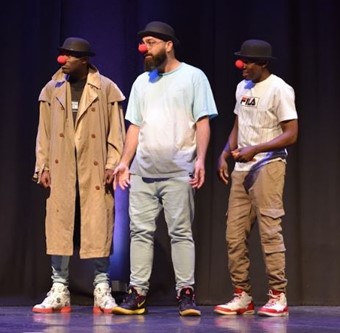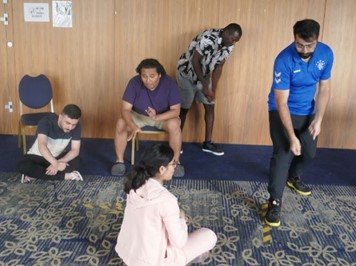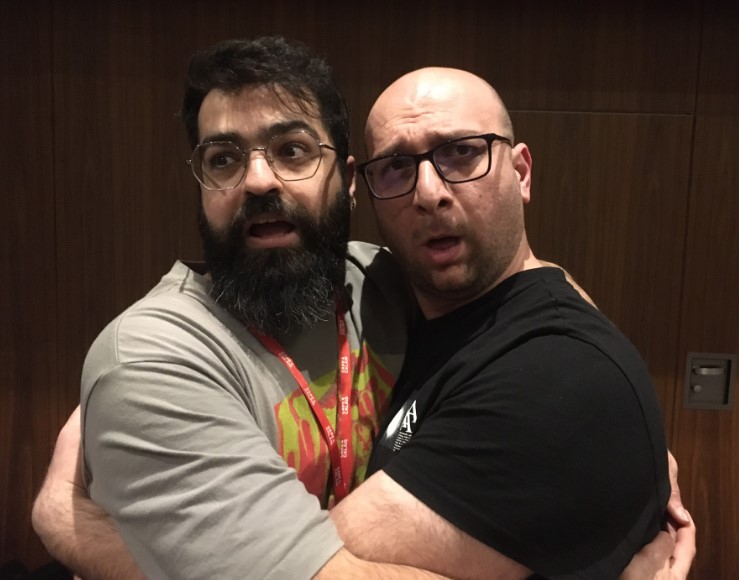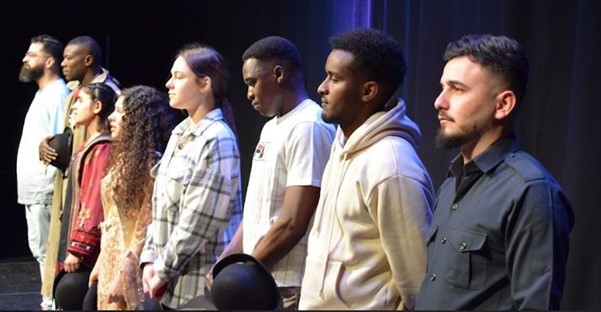Guest blog by Zhvan Theatre Company
From adversity to opportunity…
Everything had seemed to be coming together. The play was written, the cast was complete, rehearsals were going well, and we had (tentative) bookings for our show during Refugee Week. We were proud of what we had achieved. And then the news came. Dropped rather, for that was how it felt. One of our cast received the news that he was to be relocated to the Bibby Stockholm. In four days time.
There is not really an appeals process, but what protestations could be made, were. R had made himself into a valued member of the local community, playing a leading role in the nearby food bank, organising volunteers. As, when and if he was granted permission to stay, they were offering training, employment. Plus, of course, he was an irreplaceable member of our cast. And all of this would be thrown into jeopardy if he had to move to Dorset. But none of this was of any interest to the Home Office. His name was on the list; he had to go.
The play we were rehearsing, didi and gogo are waiting, had come from some Drama classes at the Holiday Inn in Wembley. Didi and Gogo are the main characters of a famous play, Waiting For Godot, about two tramps forced together, unable to leave, forced to wait for someone who never appears… As good a depiction of the asylum process as one would be likely to find. And when a third person joined the group, he had to be included, which tilted the production into a slightly more surreal approach. Our version took these characters, a refugee, an asylum-seeker, and a tree, and explored their relationship with each other, with authority, even with a passing seagull. And now we had lost our Gogo.
We were, of course, instantly devastated, but almost as quickly, determined not to allow this to derail us entirely. Our first move was to arrange to hold at least one rehearsal in Dorset; if R could not come to us, we would go to him. I made contact with the voluntary group providing support for asylum-seekers on the Bibby, arranged the loan of a small space to rehearse in, and, one Saturday, Didi and I drove down to Dorset, met up with R, and rehearsed (hugely enjoyable and most productive.)
The distance involved did not make this viable as a regular occurrence, however, so in other rehearsals we employed technology, with R acting his part as best he could in the person of a phone sitting on a chair. But with the technology proving less than reliable, and this approach in any case unsatisfactory when it came to rehearsing the physical elements of the show, we were more than delighted when R walked in to our rehearsal in London. The food bank charity, desperate for his assistance, had funded his journey to London, and he had managed to arrange this on rehearsal day. Rehearsals were back on track.
Two dates had now been confirmed for performance in London, and as can so often be the way, the problems R had encountered led to opportunity. I was in contact with the organisers for Migrant Help in Portland, through them had been introduced to various arts organisations involved with organising events there, and now we had another performance slot, performing at the Dry Dock, a community venue in Weymouth, in the middle of Refugee Week.
So what had initially appeared as unmitigated disaster was now a terrific opportunity, all’s well that ends well, and all that. Not, of course, that we have yet reached the end, nor exactly when that will be. The end of Refugee Week? Or the opportunities that develop after that?



Zhvan Theatre Company
Zhvan (pronounced Je-wun) is a Kurdish word meaning beautiful, sometimes of people, sometimes of a place, to our mind both of which were relevant to what we were trying to achieve. The theatre company itself sprang from a weekly Drama class for asylum-seekers living in three asylum hotels in Wembley, which I have been running there for the past two years. I had hoped from the start to have the opportunity to introduce the group to the joy and excitement of live theatre, but there were always challenges: to create theatre requires a certain consistency of attendance and commitment, and the inevitably chaotic nature of the residents’ lives there made this problematic. Nonetheless, we have managed to create and perform three productions, of varying degrees of sophistication, and are currently rehearsing out fourth.
These have been: Two folk tales – one from Syria, the other a version of The Boy Who Cried Wolf (or, in Farsi, The Lying Shepherd) at an informal production in the Holiday Inn.
No Waiting, a play exploring the universal asylum-seeker experience of waiting for a decision, at the Beck Theatre in Hayes, and at Kensal Rise library.
Journeys, looking at the journey from their homeland to Britain of three members of the group, as a work-in-progress performance at the Migrant Connections festival in Streatham.
We are currently rehearsing ‘Didi and Gogo are waiting’, an ambitious fully-scripted short play in which a group of asylum-seekers, starting to stage their own version of Waiting For Godot, break off to explore the links with their own situation.
